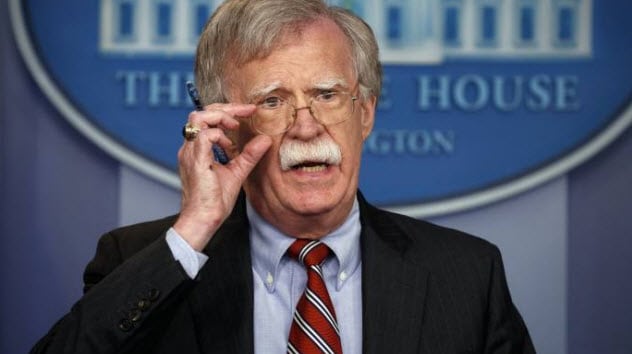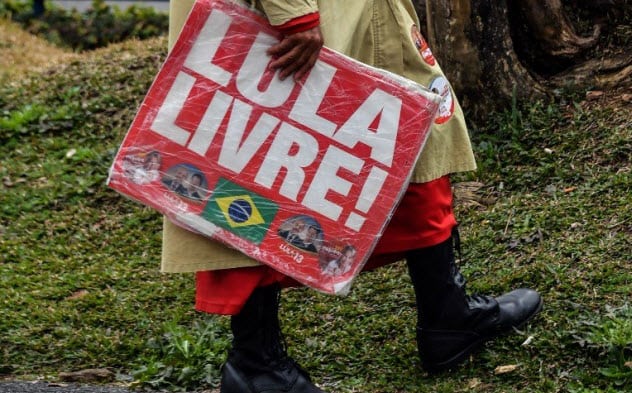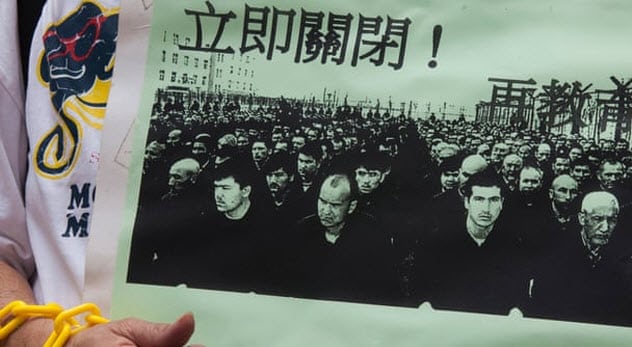 History
History  History
History  Health
Health 10 Everyday Activities That Secretly Alter Consciousness
 History
History Top 10 Historical Disasters Caused by Someone Calling in Sick
 Animals
Animals 10 New Shark Secrets That Recently Dropped
 Movies and TV
Movies and TV 10 Forgotten Realities of Early Live Television Broadcasts
 Technology
Technology 10 Stopgap Technologies That Became Industry Standards
 Weird Stuff
Weird Stuff 10 Wild Facts About Taxidermy That You Probably Didn’t Know
 Travel
Travel 10 Beautiful Travel Destinations (That Will Kill You)
 Miscellaneous
Miscellaneous 10 Modern Marriage Rituals Born from Corporate Branding
 Weird Stuff
Weird Stuff Ten Bizarre Visions of 2026 from Fiction
 History
History 10 “Modern” Problems with Surprising Historical Analogs
 Health
Health 10 Everyday Activities That Secretly Alter Consciousness
 History
History Top 10 Historical Disasters Caused by Someone Calling in Sick
Who's Behind Listverse?

Jamie Frater
Head Editor
Jamie founded Listverse due to an insatiable desire to share fascinating, obscure, and bizarre facts. He has been a guest speaker on numerous national radio and television stations and is a five time published author.
More About Us Animals
Animals 10 New Shark Secrets That Recently Dropped
 Movies and TV
Movies and TV 10 Forgotten Realities of Early Live Television Broadcasts
 Technology
Technology 10 Stopgap Technologies That Became Industry Standards
 Weird Stuff
Weird Stuff 10 Wild Facts About Taxidermy That You Probably Didn’t Know
 Travel
Travel 10 Beautiful Travel Destinations (That Will Kill You)
 Miscellaneous
Miscellaneous 10 Modern Marriage Rituals Born from Corporate Branding
 Weird Stuff
Weird Stuff Ten Bizarre Visions of 2026 from Fiction
10 Mind-Blowing Things That Happened This Week (9/14/18)
Keeping up with the news is hard. So hard, in fact, that we’ve decided to save you the hassle by rounding up the most significant, unusual, or just plain old mind-blowing stories each week.
After two weeks’ absence, Morris M. is back to guide you through the dimly lit forest of headlines in search of the path marked “this week’s important news.” Grab a torch, and prepare yourself for a foray into the swirling shadows of US politics, international LGBT rights, and the latest round of chaos gripping the EU.
10 Sweden’s Elections Disappointed Everyone

On Sunday, Sweden went to the polls in an election that had been hotly anticipated across the globe. Not because the world has suddenly awakened to the importance of parking permits in Malmo, but because this election was tipped as a bellwether for the resurgence of the populist right or a big win for the center. In the end, it was neither.
Exit polls indicated that the anti-immigrant populist Sweden Democrats would break the 20 percent barrier, but the party wound up falling short with only 17.6 percent of the vote. While it was certainly a big increase from their last election, it stopped short of being the undeniable breakthrough that populist parties have made elsewhere.
But if the populist right stumbled, so did the mainstream. The center-right Alliance bloc failed to overtake the incumbent center-left bloc of the Social Democrats, Greens, and Left. Meanwhile, the governing bloc lost their majority, leaving parliament deadlocked. As both right and left have refused to work with the Swedish Democrats, expect torturous coalition negotiations.[1]
9 The US Threatened The ICC With Sanctions

The International Criminal Court (ICC) was established in 2002 as a mechanism for bringing war criminals and genocidal dictators to justice. Prior to its creation, the world had relied on ad hoc tribunals like the International Criminal Tribunal for the former Yugoslavia (ICTY) or the Nuremberg trials. The ICC was meant to streamline this process.
However, several major countries refused to join, including the USA, China, Russia, and India (otherwise known as “four of the most important countries in the world”). As a result, the ICC has always been a little toothless.
Now it might be about to get its last remaining incisors punched out. On Monday, White House national security adviser John Bolton threatened to impose sanctions on the ICC, including prosecuting the court’s judges.
The ICC has recently been making noise about opening an investigation into CIA conduct in Afghanistan, which could theoretically see Americans charged with war crimes. Bolton’s speech was a warning shot across their bows. The ICC has pledged that they will not be deterred.[2]
8 India Struck Down A Colonial-Era Law Making Gay Sex Illegal . . .

Okay, so this actually happened last Thursday. But as this columnist was away last week, we guess we can report it anyway. On September 6, India’s Supreme Court issued an unexpected verdict. The justices struck down the colonial-era Section 377 of the penal code, which outlawed gay sex. After a quarter of a century of legal challenges, India finally decriminalized homosexuality.
The ruling was based upon ideas of individual freedom. One judge wrote in his ruling that “only when each and every individual is liberated from the shackles of such bondage . . . that we can call ourselves a truly free society.”[3]
A study used in the case had estimated that 8 percent of India’s population might qualify as LGBT, meaning 104 million lives were potentially affected by the judgment. That’s nearly the equivalent of the entire populations of Texas, California, Florida, and Pennsylvania combined.
The ruling set off major parties across many of India’s biggest cities. It also offered further evidence that Asia is slowly beginning to follow a more LGBT-friendly path.
7 . . . But Romania Moved To Outlaw Gay Marriage

While pro-LGBT groups in India continued to celebrate their unexpected victory, Romania’s LGBT activists were sinking into despair. On Tuesday afternoon, the Romanian Senate passed a bill calling for a referendum on changing the constitution to outlaw gay marriage. The EU nation will now go to the polls sometime next month to vote on the issue.
The bill originally passed the lower chamber way back in May 2017, after which it languished. However, a key EU ruling this year seems to have revived it.
In June, the Union’s highest court ruled that all member states must recognize gay marriages performed in other nations even if they do not allow gay marriage themselves. The case had originally been brought against Romania (although it affected other states like Bulgaria, Latvia, and Slovakia) and seems to have stoked a major backlash.[4]
Under Romanian law, a referendum must now be held within one month, with October 7 earmarked as the most likely date. More on this story when the results come in.
6 Ethiopia And Eritrea Reopened Their Borders For The First Time In Two Decades

In its own way, it was as touching as the reunions that sporadically take place on the border between South Korea and North Korea. On Tuesday, Ethiopia and Eritrea reopened two border crossings between their nations for the first time in 20 years.
As news crews looked on, families and friends who had been apart for two decades were finally reunited. It was just the latest move in a dramatic thaw between the two Horn of Africa countries.
Once a part of Ethiopia, Eritrea declared independence in 1991. Although Ethiopia initially remained friendly with its former province, relations soon soured. In 1998, the border was closed and a vicious war erupted that killed somewhere between 70,000 and 100,000 people.
Although peace was reached in 2000, Ethiopia never implemented its part of the treaty. It was only earlier this year that Ethiopia’s new PM, Abiy Ahmed, agreed to finally get his country off a war footing.
The newly opened borders also give Ethiopia easy access to a seaport for the first time since 1998, a bonus the economy-conscious Ahmed doubtless had in mind.[5]
5 Brazil’s Jailed Front-Runner Pulled Out Of The Presidential Race

Luiz Inacio Lula da Silva has had one heck of a turbulent career. Known as Lula, he was president of Brazil from 2003–2011 and briefly served as his successor’s chief of staff. He was insanely popular but also demonstrably corrupt. In April 2018, he was jailed for 12 years for money laundering related to Brazil’s Operation Car Wash scandal—possibly the biggest corruption case in history.
There, his story should have ended, but Brazil was in the middle of an election year. For the last few months, Lula has run a dazzlingly popular campaign from inside his cell with poll after poll placing him as the clear front-runner. In August, Brazilian authorities finally clamped down on this insanity and excluded Lula from the race. On Tuesday, he finally capitulated and suspended his campaign.[6]
Lula’s party has now pitched an emergency replacement candidate known as Fernando Haddad. If Haddad can successfully pull in all of Lula’s voters, he will probably win. But that’s a big “if.”
4 The Trump Administration Went Toe to Toe With China Over Muslim Rights

Fairly or unfairly, the general perception of the current White House administration is that it is not particularly friendly toward Muslims. So Wednesday’s news may have raised a few eyebrows.
According to multiple reports, the Trump administration is weighing sanctions against China. Only this time, the proposed penalties are unrelated to the current trade spat. They have to do with China’s abuse of its Uighur Muslim minority.
The state of Xinjiang in China’s northwest has long been a source of trouble, with Uighurs occasionally turning to violence to protest Beijing’s rule. This being China, Beijing’s response has been predictably disproportionate.[7]
Up to one million Uighurs and other Muslim minorities have been rounded up and placed in concentration camps. Those who remain free are subject to a level of surveillance so intense it’d give George Orwell nightmares.
Were Washington to move ahead with these sanctions, it would mark a notable break with the past. US presidents are notoriously unwilling to take action against Beijing for human rights abuses, and Trump has so far stuck to that line. Is all that about to change?
3 We Finally Reached The End Of Primary Season

So, that’s it until 2020. After a glorious couple of months which saw not a few upsets, the 2018 primary season finally wound down to a close this week as New Hampshire, Rhode Island, and New York picked their candidates for the upcoming midterms. While New York hasn’t actually voted at the time of this writing, so far the last week of primary season has been relatively lacking in surprises.[8]
In fact, the biggest upset in Tuesday’s New Hampshire primary may have been the lack of upset. Establishment Democrats steamrollered the field, leaving the progressive wing broken and the wildcards looking not a little pathetic. On the Republican side, Trump-supporter Eddie Edwards won his shot at becoming the state’s first black congressman, but he was already the favorite. (His opponent, Andy Sanborn, stood accused of sexually harassing an intern.)
Unless New York throws up something unexpected, it’ll be a weirdly gentle end to a crazy season. Recall, this is the primary season that gave us Jeff Johnson unexpectedly trouncing GOP elite Tim Pawlenty in Minnesota, a real nail-biter in the GOP Kansas governor’s race, and, umm, Bigfoot erotica. It’s been fun, folks.
2 The EU And Hungary Clashed—Hard

Hungary joined the EU in 2004, following a vote a year earlier that saw a whopping 83 percent of voters plump for “yes” (albeit on a turnout of below 50 percent). Since then, both sides seem to have regretted the decision.
Long-term ultranationalist Hungarian leader Viktor Orban has made no secret of his virulent hatred for the liberalism of Brussels, its immigration policies, or what he sees as a sidelining of Christianity and Hungary’s national identity. On the other side, Brussels has repeatedly warned of Hungary’s eroding of the rule of law and the endless graft and embezzlement that Orban’s friends and family seem to be indulging in.
This week, the tensions finally came to a head as a meeting of MEPs turned into a war of words. At stake was the triggering of Article 7, which would suspend Hungary’s rights as a member and has only ever been used against Poland. The EU has no mechanism to expel a member.[9]
Orban was hoping to make common cause with other rightists. However, in the end, even many of the bloc’s most anti-immigration members stood against him, including Austria’s Sebastian Kurz and Germany’s Manfred Weber. If Orban hates the EU so much, one has to wonder why he doesn’t just call a referendum and organize a “Hungrexit?”
1 Theresa May’s Future Hung In The Balance

Pop quiz: Who’s the leader with the worst job in the entire Western world?
Why, that’d be Theresa May of Great Britain. She is currently trying to navigate the insanely choppy waters of Brexit without a government majority in the House of Commons while relying on the support of Northern Irish fundamentalists. And she has a party that desperately wants to stab her in the back for being either too pro- or too anti-Brexit, depending on who’s holding the knife.
Well, if the rumors are true, she may not have to worry about her demanding job much longer. This week, a group of 50 pro-Brexit Tory MPs openly began plotting to defenestrate their much unloved leader. Given that Britain is a scant two months away from the deadline to present the EU with London’s Brexit plan, this has the potential to cause chaos.
At the heart of the dispute is the Chequers plan, May’s attempt to pull together the pro- and anti-Brexit wings of her party. Although pro-EU moderates have voiced disquiet with the plan, the worst venom has come from Brexiteers, who believe it will leave the UK tied to Europe. There’s now open talk of a coup to depose May if she won’t ditch the plan and install a Brexit-friendly candidate.[10]
However, it’s worth pointing out that Remain Tories are also a potent force and wouldn’t let May go down without a fight. That’s aside from the insanity of trying to replace the PM just as the biggest shake-up in UK politics in over 40 years is bearing down.
Is May a dead woman walking? We may find out soon.
Missed the news lately? Catch up on more mind-blowing events from August 24, 2018, and August 17, 2018.








